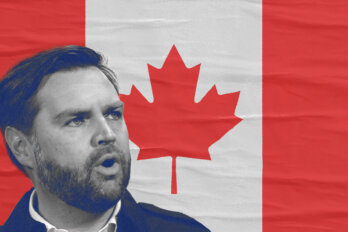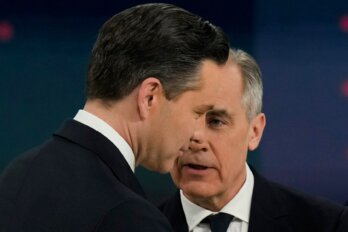In October 2022, Vancouver took a chance on a brand new—and largely conservative—political party. A Better City (ABC), which launched in 2021, focused a large portion of its campaign platform on securing public safety and housing affordability, two of the city’s most pressing and recurrent issues, during the 2022 civic election. For the preceding four years, six city councillors had represented politically progressive parties, and the mayor had previously been a New Democratic Party member of Parliament. But rising crime rates in some of the city’s neighbourhoods and a worsening homelessness crisis seemed to trigger a rightward shift among voters, who elected every single one of ABC’s nineteen candidates for the mayorship, the city council, the park board, and the school board. Former investment banker and entrepreneur Ken Sim became mayor, and ABC secured a supermajority in the city council.
Now, ABC faces its first real electoral test. On April 5, Vancouver will hold a by-election to fill two seats vacated by city councillors representing progressive parties. OneCity’s Christine Boyle resigned last October to take on her role as the newly elected NDP MLA for Vancouver-Little Mountain, and the Green Party’s Adriane Carr stepped down in January, declaring she’s “lost confidence and trust” in the mayor. Their departure leaves only two opposition members on what is typically a ten-seat council. For many Vancouverites, the by-election could be considered a “referendum on ABC’s governance,” says Andy Yan, associate professor in the urban studies program and director of the city program at Simon Fraser University.
ABC’s 2022 platform claimed it would address housing needs across different income levels and demographics, focusing on securing more for-profit and subsidized housing—though these were presented as two separate goals. Since the election, the ABC-dominated council has repeatedly shown that the city’s unhoused and low-income populations are not a priority. In early February, for example, Sim announced a strategy that would enable the city to develop market rental housing on city-owned land. The strategy aims to bridge housing shortages by “deliver[ing] more middle-income housing, while generating non-tax revenue for the City,” according to a press release from the mayor’s office. Effectively, this means the city would act as the landowner and property developer for these projects.
But critics have expressed worry over the government operating like a business, prioritizing profit generation over the people it serves. “The housing being built is simply not matching the income bracket of the people needing housing,” Yan says. This was true of the previous city council, he points out: between 2017 and 2023, 3 percent of all housing approved was considered affordable for those earning less than $30,000 a year, despite that demographic making up 15 percent of the population. And just last year, a new residential project, supported by the city alongside the provincial government, was advertised as “affordable” but listed the price for a studio apartment as a hefty $2,600. Yan also notes that many of the new private development projects approved by the city replace affordable rental housing with inaccessible, luxury housing.
Meanwhile, there has been little progress on tackling the homelessness crisis. In April 2023, the Vancouver Police Department spent nearly $550,000 on a week-long operation to clear encampments on East Hastings Street, where hundreds lived in tents. Over $405,000 of that money went to police salaries and benefits, according to The Tyee. Some of the displaced residents were offered shelter or short-term accommodation, but there was no long-term housing plan.
Later that year, in July, the city council voted down a motion to extend the leases of temporary modular housing sites across the city. This form of low-cost housing, which was built on city-owned land that was temporarily unused while developers waited for building permits or rezoning decisions, provided over 750 units for people who were then homeless or at risk of homelessness. The first site to be demolished after the vote eliminated ninety-eight units of self-contained housing. (The residents were relocated to social housing.) These spaces offered better conditions than shelters, and the loss of the units in the midst of a housing crisis was particularly devastating.
This past February, a leaked memo reportedly showed that part of Sim’s plan for “invigorating” the Downtown Eastside initially proposed the “re-unification” of members of the neighbourhood’s Indigenous population with their home nations. The plan has been condemned by the BC Assembly of First Nations, and critics say it’s a ploy to gentrify the Downtown Eastside, raising property values rather than helping current residents. Later in the month, the council approved a moratorium on new supportive housing projects, a form of affordable housing that provides services such as medical assistance and on-site meal programs for at-risk communities and those experiencing homelessness. Many housing advocates and a number of politicians, including two ABC members, expressed concern that this decision could exacerbate Vancouver’s homelessness crisis.
Sim and the city council’s performance on public safety has also prompted ample scrutiny. City-wide incidents of violent crime reportedly rose in 2024, and while there are multiple causes for that—including a lack of social supports for those experiencing homelessness and mental illness—the mayor and council seem to be focused on a single solution: more police. Over the past two and a half years, they have dramatically increased the VPD’s budget while also reducing oversight by slashing two-thirds of the police board’s budget in December 2023, according to the Vancouver Sun. ABC’s platform had pledged to “hire 100 New Police Officers and 100 Mental Health Nurses as part of a renewed approach to community policing,” but only the first promise has been carried out. The city has introduced grant funding to recruit fifty-eight mental health workers in areas such as crisis de-escalation and Indigenous health services.
In late 2023, the ABC-dominated Vancouver School Board also voted to reintroduce police officers in schools. Before the school liaison program ended in 2021, Black and Indigenous students were more likely to say they felt “uncomfortable, scared, anxious” by the presence of liaison officers, according to a report commissioned by the Vancouver School Board and published in January of that year.
“ABC’s sizable investment in policing shows that they have a one dimensional understanding of the issues affecting public safety,” Yan says. “Policing ought to be a last resort and not a first approach.” Investing in housing, mental health and addictions support, and economic development, he says, would better ensure safety.
Other controversial council decisions include voting in favour of dissolving the city’s 137-year-old elected park board, suspending the work of the city’s integrity commissioner, thereby halting misconduct investigations—until the decision was reversed two months later—and adopting the International Holocaust Remembrance Alliance’s definition of antisemitism, which designates criticism of the state of Israel as an antisemitic expression. (The decision drew widespread opposition, with some human rights advocates and academics arguing it silences criticism of Israel.)
Perhaps the biggest sign of ABC’s ineffectiveness is just how much dissatisfaction it has prompted among its own elected officials. Since 2023, three ABC park board commissioners have been expelled for opposing Sim’s plan to dissolve the board; the chair of the school board quit over transparency concerns; and a councillor was booted for no longer being a “core value fit,” according to the party’s president, Stephen Molnar. Ex-ABC officials cite the discrepancy between the party’s campaign promises and actions as their reason for leaving. The mayor has been absent for over a third of the city council’s votes, according to the Vancouver Sun.
ABC’s candidate choices in the by-election signal the party’s continued emphasis on policing. After a former police constable and spokesperson, Brian Montague, was elected to the city council in 2022, ABC has since put Ralph Kaisers, former president of the Vancouver Police Union, alongside tech businessman Jaime Stein, on their ballot. Kaisers, who has served in the VPD for thirty-four years, has repeatedly come under public scrutiny, most notably for his alleged role in the VPD’s divergence from due procedure following the 2015 killing of Myles Gray, a thirty-three-year-old business owner who was choked, restrained, and violently beaten by officers as they attempted to subdue him. Kaisers also recently shared a photoshopped sign that read “Fuck the DTES Grifters, Power to the Working Class,” mocking and belittling the Downtown Eastside community, many of whom are unhoused.
ABC owes its landslide win in 2022 in part to the splitting of the progressive vote over six parties. To avoid a similar outcome in this by-election, progressive parties entered into talks ahead of candidate announcements. Ultimately, three parties—the Greens, OneCity, and the Coalition of Progressive Electors, or COPE—decided to run a single candidate each. Support for them on social media, particularly X and Reddit, seems to far exceed that shown for ABC, with many users posting they’d vote for anyone but ABC. One Reddit poster said that the ABC they voted for in 2022 was no longer the same party, mirroring the sentiment of the elected officials who had abandoned it.
But Yan cautions against assuming that social media posts accurately reflect the electorate. After all, ABC policies speak to many of Vancouver’s conservative and NIMBY voters, who have shown consistent support for Sim and his party. ABC reportedly raised more funds in 2023 than rival parties. It’s also worth noting that Elections BC is currently investigating the party’s campaign finances for the 2022 election.
Given ABC’s supermajority in the city council, it is unlikely that any outcome would disrupt its ability to pass legislation. But strong opposition councillors could challenge ABC’s power and better represent the city’s broad spectrum of opinions. “A candidate like COPE’s Sean Orr can act as a thorn in ABC’s side if he can summon the spirit of Harry Rankin,” Yan says, referring to a COPE co-founder and long-term councillor who was a fierce defender of the city’s underprivileged communities.
This vote may serve as a staging ground for left-wing parties looking to regain seats in next year’s municipal election. But the outcome might also help determine whether Vancouver’s shift to the right in 2022 was an early indicator of a new trend or an already dying flame.





